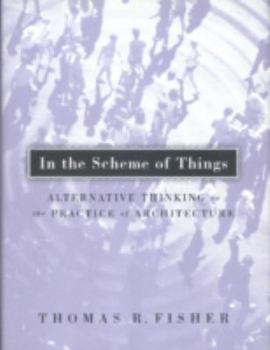In the Scheme of Things: Alternative Thinking on the Practice of Architecture
Select Format
Select Condition 
Book Overview
One of the field's most innovative thinkers reconsiders the purpose and practice of architecture. At the dawn of the twenty-first century, architecture is in a state of crisis. Numbed by an ugly and shoddily constructed built environment and outraged by the cost of high-profile design projects, the public has become disinterested in and contemptuous of architecture as both a profession and an art. At the same time, some of our most creative designers have isolated themselves from the tastes and needs of mainstream society, reflecting a similar malaise found in design and architecture schools around the country. In this troubling climate, Thomas R. Fisher--who challenged architects as editorial director of Progressive Architecture, becoming recognized as one of the field's most original thinkers--contends that the purpose and prospects of architectural practice must be reconsidered and reenergized. In the Scheme of Things looks at architecture's need to respond creatively and meaningfully to the extraordinary changes affecting the profession now, changes that include the global economy, the advent of computer-aided design, and the growing disconnection between design schools, architectural practice, and the public. In each of the twelve essays that comprise this timely volume, Fisher addresses issues of vital concern to architects and students, offering hard-hitting criticism and proposing innovative and practical ideas for reform at the level of both the individual practitioner and the profession as a whole. Through his thoughtful and nuanced consideration of architecture's ideological foundations and its relationship to ecology, politics, and technology, as well as his subtle understanding of the architect's interior life, Fisher challenges the demoralized design community to recapture its historical role as steward and visionary of the public realm. Thomas R. Fisher is dean of the College of Architecture and Landscape Architecture at the University of Minnesota and coeditor of Architectural Research Quarterly. His essays have appeared in Design Quarterly, Architectural Record, and other leading journals.
Format:Hardcover
Language:English
ISBN:0816636532
ISBN13:9780816636532
Release Date:January 2000
Publisher:University of Minnesota Press
Length:176 Pages
Weight:0.94 lbs.
Dimensions:0.7" x 6.3" x 8.3"
Customer Reviews
1 rating
The Good Life and Architecture
Published by Thriftbooks.com User , 24 years ago
This book is essential reading for anyone who cares about the future of architectural education and practice. The author, Thomas R. Fisher, now Dean of University of Minnesota's College of Architecture and Landscape Architecture, goes right to the point of what is wrong with architecture today, and offers both questions for debate and answers he can support.Always an original thinker about architecture, and well-known for his bold opinions as editor of what was the field's most important professional magazine, the now defunct Progressive Architecture, Fisher is very clear on the discipline's one big idea: "...all good architecture puts forward a proposition, whether the designer is aware of it or not, about the good life, about how we should live and what we should live for." As he would be the first to admit, many architects lose sight of this proposition, and from the general public's perspective, if architecture is supposed to be about making life better, most architects have a funny way of showing it.Fisher is clear on what has to be done. Architecture, in its education, internships, and practice has to reconnect to what he calls a comprehensible "public fiction" of what design can do for buildings, places, and cities. He recognizes architects Le Corbusier and Frank Lloyd Wright, as well as ur-designers Charles and Ray Eames, and architectural historian Vincent Scully, as cogent, forceful advocates of strong "fictions" of how design could make life better, whether by integrating technology, by connecting to the earth and place, or by unprecedented seeing patterns and connections, can shape a world where people can live, work, and play in environments that are both functional and meaningful. Fisher calls the organizing principles of these designers' work "fictions" because declarations that "the house is a machine to live in," for example, is by no means an absolute truth, but it is a vision that yielded decades of extraordinary environments. To me, the term "narrative" or "vision," as tired as those words are, might better make the point, since "fiction" can hold the stigma of deliberate deception.In the Scheme of Things outlines the philosophical and historical basis for past "fictions," as well as ones to come, leaning heavily on the Pragmatist work of John Dewey, and as with the recent "Pragmatist Imagination" conference at the Museum of Modern Art, he implies that this kind of enlightened utilitarianism remains the firmest ground for a discipline that has lost its way. To Fisher, if it is to find its way back, architecture will have to take communicating with the general public much more seriously, make clear that design is about solving problems, not an application of taste from a historical or avant-garde catalogue, and have to reconnect education and practice. He is too cavalier in his dismissal of formalism-no matter how many times you say architecture is research and problem-solving, it is also about the way things look, and





